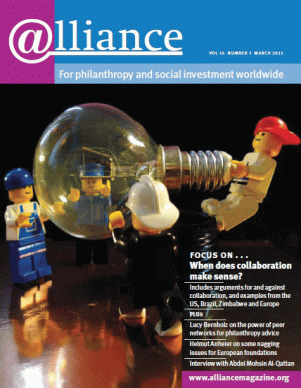When thinking about what associations of foundations could achieve, perhaps our first step should be to reflect on what it is that philanthropy does. Foundations work towards achieving change, whether it is addressing the root causes of inequality or the suffering that inequality causes. We want to do good, to have positive impact, to make a difference.
The ways in which we do this are varied, but more and more I think as a sector we need to ask ourselves hard questions about our own effectiveness and our willingness to do all those things we are uniquely placed to do – take risks, use our independent voice, convene, and speak quiet truth to power. Some of that means facing what many of us find the most uncomfortable truth: that we have power and our power is largely unaccountable.
This brings great responsibility and, I believe, an obligation to use this position of privilege to make positive change. It’s not just about giving money away; it’s also about doing all the actions that are available to a sector that is not beholden to shareholders, commercial interests or fundraising. It’s about using our independent voice to the greatest advantage and working in ways that make this the most effective that we can.
So, if individual foundations have a responsibility to maximize the positive impact of their philanthropy, what does this mean for the foundation associations that we join? Associations have a dilemma in that they are reliant on their members for their survival, and can feel that they must appeal to as many of them as possible in order to survive. The notion of service is important in this connection, as is protecting their members’ interests. The risk is that associations can devote too much of their time to individual requests and that a lowest common denominator approach prevails.
Instead, I believe that associations are most valuable to the project of philanthropy when they provide leadership and use their unique voice to guard their membership’s missions – ie when they serve to remind us of the actual outcomes we exist to achieve. Just as foundations have the ability to take a macro view of the issue areas that they support, so too can associations provide an overview of what is happening with philanthropy itself. They can make us better informed about what is happening across our own field; they can question the status quo and hopefully help us ask questions of ourselves about how our work is reflecting the prevailing political and social environment.
Associations can and should represent the project of philanthropy in the policy and political spaces in which we operate. Excellent examples of this exist. The European Foundation Centre’s work promoting the European Foundation Statute and the Association of Charitable Foundations’ work making the case against minimum spend rates for UK foundations are two examples of projects where no individual foundation could hope to have the weight with government bodies that a body representing us all can have. And this work matters – it guards and promotes the project of philanthropy to create positive social change, and we should not take it for granted.
Responsibility also lies with foundation staff themselves. Foundations are sometimes reluctant to invest in the infrastructure that supports our work. While happy to provide capacity building for our NGO partners, we are much less keen to invest properly in the very associations that should be making our work more effective and more accountable, and protecting the project of philanthropy for those who come after us. Very few of us are actual philanthropists spending our own money – most of us are professional, paid employees – and yet we sometimes almost seem to wish to maintain a fiction of amateurism, where spending money on making our own practice better is unseemly.
I am excited by the potential of associations of foundations in this decade. One of the advantages of living in a globalized environment is that we can so easily connect with and learn from foundation associations across the world. This would be an impossible task for any one foundation but is a central opportunity for WINGS. It is up to foundations to ensure that their own associations have the financial support they need.
Astrid Bonfield is chief executive of the Diana, Princess of Wales Memorial Fund. Email astrid.bonfield@memfund.org.uk
See here for Rosa Gallego’s write-up of the recent meeting in Moscow of DAFNE – Donors and Foundations’ Networks in Europe.





Comments (0)